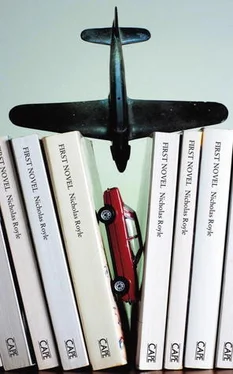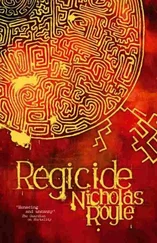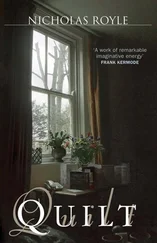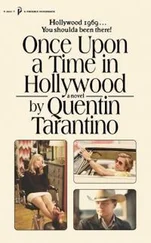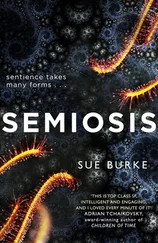In Martin Amis’ room, in a separate building at the end of his garden, light pours in through a glass ceiling and there are numerous books scattered in an apparently random pattern on the floor: a huge book on Vladimir Nabokov and two or three spiral-bound manuscripts. On a table in the foreground, a paperback edition of J. G. Ballard’s Cocaine Nights with a yellow Waterstone’s 3-for-2 sticker showing that he didn’t blag a copy, he bought it. The shelves seem to house mainly non-fiction: books on Hitler, Islam, cultural amnesia. Amis’ own books are lined up on Catherine O’Flynn’s shelves in a large photograph appearing in another newspaper, the Independent: London Fields, Other People, Night Train . Hilary Mantel is there too with Beyond Black . James Ellroy, Kurt Vonnegut, David Foster Wallace, Camus, Kafka. But there appears no order, alphabetical or otherwise. Still, I can see that the book I’m looking for is not there. Or not in shot, at least.
Julie Myerson is photographed, also in the Independent , in front of, or rather sitting below, a shelf of first editions protected by plastic covers. You can see the light glinting off them. Murdoch, Updike. When it’s her turn in the Guardian , it’s strikingly domestic: cat basket, baby photo, a tiny pile of books to the right of the desk. Joanne Harris, in the Observer Magazine , reveals that she collects French books, the Livre de Poche colophon and distinctive spine recognisable even across the room. Also in two separate Observer supplements, plastic covers are in evidence in different shots of, again, Siri Hustvedt, photographs clearly taken on the same day, unless she wears that black and white striped cardigan and dangly earrings for every photographer that comes to the house. In the background a wall-mounted bookcase, lines of serious-looking volumes in plastic sleeves. An olive-green leather sofa. In one shot, Hustvedt stretches out her long legs across the wide cushions; in the other she is sitting on the floor in front of the sofa leaning on the coffee table in the foreground on which are stacked various large-format books: Conjunctions 49: A Writers’ Aviary , a monograph of René Char, L’Oeil de Simenon , a visitors’ guide to New York City and The Nancy Book by Joe Brainard. To the right of the sofa is another bookcase on the adjoining wall. It contains a number of orange-spined books that could be Penguins but equally might not be.
Both Marina Warner and Simon Armitage have music stands.
Sarah Waters, Charlotte Mendelson and Sebastian Faulks all have the same poster on the wall, the wartime slogan ‘KEEP CALM AND CARRY ON’, in white on a red background.
Will Self and Sarah Waters have maps of London hanging on the wall. Robert Irwin has a map of the Middle East and North Africa. Esther Freud has an etching by her father Lucian, J. G. Ballard a copy of a painting by Paul Delvaux. Hanif Kureishi has a picture of Kate Moss above his desk. Kate Mosse has a photograph of sunrise in the Pyrenees.
William Boyd, Jacqueline Wilson, Adam Thirlwell, Anne Enright, Blake Morrison, Jonathan Bate, Sebastian Faulks and Deborah Moggach are all Mac users.
Simon Gray, John Mortimer and J. G. Ballard have all died since appearing.
Michael Holroyd and Margaret Drabble, husband and wife, have both been featured, separately, in the Guardian series. His room is much untidier than hers. Claire Tomalin’s room is caught in the photographer’s lens three months after that of her husband, Michael Frayn. Hunter Davies, still using an Amstrad PCW9512, is scarcely more technologically evolved than his wife, Margaret Forster, with her fountain pen and A4 paper. Joanna Briscoe and Charlotte Mendelson live together in north London; their respective rooms appear almost a year apart. Mendelson’s temporary lodging in the downstairs front room is dominated by children’s toys, kitchenware and an improvised barrier against the life of the street — a huge mountain of boxes blocking out the view of Dartmouth Park — while Briscoe’s beloved top-floor book-lined ‘tree house’ study is destined to become a bedroom.
Among the reference volumes on Briscoe’s bookshelves is an edition of the Time Out Film Guide , not recent enough to include Andrew Davies’ adaptation of her novel, Sleep With Me. Halliwell’s Film Guide sits on Marina Warner’s shelf; had he still been alive on its release, it’s doubtful Leslie Halliwell would have liked — or even included — Iain Sinclair and Chris Petit’s film Asylum , in which Warner appears as herself. Martin Amis and Siri Hustvedt each have a different edition of Ephraim Katz’s Film Encyclopedia .
Siri Hustvedt’s husband, Paul Auster, has not been included in the Writers’ Rooms series, but I doubt very much that it’s because he hasn’t been asked.
I have another look at Siri Hustvedt’s half-page in the Guardian . Top shelf, slightly to the left of centre. Orange spine, black text. With her long legs she’d be able to reach it with-out needing to stand on that chair — the same chair as Geoff Dyer, Alain de Botton and Francesca Simon. I imagine her lifting her left foot off the ground and standing on the toes of her right, extending her right arm and stretching her calf and trapezoid muscles, questing fingers latching on and extracting the book, taking it down, opening it, sniffing the pages. Has she read it? Is she intending to read it? I don’t know, but I’d like to find out.
I have never read Siri Hustvedt. I think maybe I should. I will start with her first novel, The Blindfold .
I am invited to read at a new monthly live literature event in town. This is an event that in a few months has become unexpectedly popular. The first night was in the basement of a bar in the university district. The venue was tiny and it was packed. If you weren’t standing by the bar there was no way you could get a drink. The organiser was a young writer who had just won a two-book deal with a fashionable publisher, but he was so modest and self-effacing in his skinny jeans and crumpled shirt, no one was anything but pleased for him. Plus, he could write, which helped.
They held the second evening in the upstairs room at the same venue, which was much bigger with a proper stage, decent seating and a disco ball hanging from the high ceiling. Still, the crowds kept coming, creative-writing students mainly, but also each successive month seemed to draw in more and more characters from the north-west writing ‘scene’. Bloggers, debut novelists, literature professionals. Lecturers in creative writing. Across town, science-fiction writers and crime novelists soldiered on in readings at local libraries where they and the sad-eyed staff easily outnumbered the few people who had dragged themselves in off the streets to ask where the writers got their ideas from and how they had found their agents.
As I sit waiting to go on, I listen to the other readers. Girls with dyed hair and low-slung jeans read rough poems about sex and alcohol. Boys with pipe-cleaner legs and Converse trainers, and bookshelves back home full of Richard Brautigan and Charles Bukowski, tell stories about pool tables and girls and lonely men and failed sexual encounters and alcohol.
I go on and look out at the sea of faces twenty years younger than mine, their owners lifting expensive bottles of beer to their lips or rolling spliffs to stick behind their ears for later on, and I wonder for the first time if these reading nights have encouraged the formation of a particular school of writing marked by whimsy and flippant jokes and throwaway lines about sexual inadequacy. I wonder, if that’s the case, how my own stuff will play. But as I stand thinking, the murmuring falls away and the room is filled with a tense, electric silence, in case I have dried.
Читать дальше
